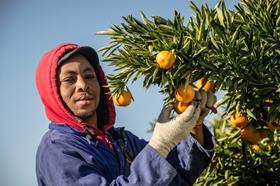
Indications that South Africa’s citrus crop is likely to significantly increase this season are expected to be confirmed when the industry publishes its first estimate in the next two weeks.
Last year the country exported 146m cartons, after a rapid increase in production over the past few years from around 100m cartons. This has been driven in no small part by the lemon and soft citrus categories.
Earlier this year the Citrus Growers’ Association (CGA) hinted at the possibility South Africa could export 200m cartons within five years. This year’s forecast will provide a clearer indication of what is to be expected during this five year period.
Optimism about a continued steep increase in production is based on plantings in recent years.
The CGA’s tree census, which is based on data collected at the end of 2020, showed that the area planted with citrus in Southern Africa had increased significantly – up 8.4 per cent from 88,569ha to 96,031ha.
It is also pointed out that most of the northern citrus regions had excellent rain this summer with possibly only a few areas in the Eastern Cape being the exception.
As the season approaches, the CGA has informed growers and exporters that, due to the UK’s exit from the European Union, South African citrus will be exempt from presenting a citrus Phytosanitary certificate [PC] for imports into the UK.
This also applies to Eswatini (Swaziland) and Zimbabwe, which forms part of the Southern African citrus fraternity.
In terms of the UK Brexit agreement, ten plants and plant products have been chosen by the UK to be exempt from requiring a PC in future.
All other plant and plant products still require a PC, even imports from the EU. “This is obviously new and replaces the EU Plant Passport which up to now was a relative easy requirement of EU internal trade,' CGA noted.
For clarification, both Ireland and Northern Ireland remain in the EU SPS area, and are therefore subject to EU import requirements.
The UK’s PC requirement comes into force on 1 April 2021 and the physical inspection commences in July 2021.
“The challenge will obviously be the initial period as all the arrangements are bedded down. So expect and cater for delays on the UK borders.”
The CGA warned that there were two aspects that growers and exporters should be aware of.
“In the unlikely event that a dispute between the EU and UK results in the UK changing its requirement and citrus fruit again needs a PC, the CGA requested that DALRRD (South Africa’s Department of Agriculture) retains the regulatory capacity, to issue EU compliance PC’s for citrus fruit going to the UK.
“The practise of SA exporters or buyers moving SA citrus fruit from the UK to the EU, for instance, should better paying options present themselves in the EU, after being duty cleared, will also no longer be possible,' CGA added. 'This is even if DALRRD has issued a SA Phytosanitary Certificate to verify the citrus fruit complied with EU import legislation.”



